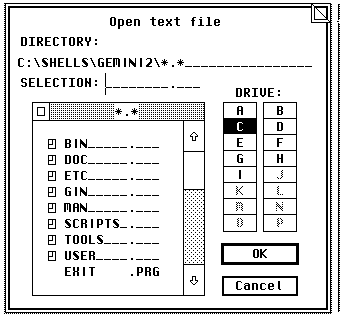
The function can be passed the following parameters:
| Parameter | Meaning | ||||||
| fs_einpath | Name of the default access path (absolute) with appended search mask; after the call it contains the new pathname | ||||||
| fs_einsel | Name of the default file; after the call it contains the newly selected filename | ||||||
| fs_eexbutton | Exit button:
| ||||||
| fs_elabel | Titelzeile |
Notes: The function should be nested with wind_update (BEG_MCTRL or END_MCTRL) to prevent double-clicks being passed on to underlying windows.
fs_einpath points to a character buffer at least 128 bytes long (200 bytes if CD-ROMs are to be accessed). fs_einsel points to a 13-byte buffer (12 for filename characters plus a terminating NULL). fs_elabel points to a buffer up to 30 characters long.
It is also present in FreeGEM. To check for this feature, use appl_init and check that xbuf.arch is non-zero.
If it is available, it should be used rather than the fsel_input call, as with the latter the user is not reminded what the function is actually doing.